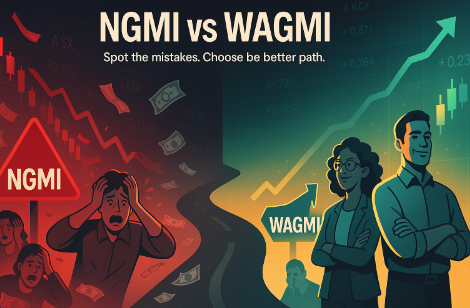
Last year was good to investors. The last decade even more so. And with markets at record highs there’s plenty of shareholders feeling pretty good about themselves — especially those that had any exposure to tech.
But as we roll into a new solar orbit, it’s worth remembering the difference between process and outcome. The market demands a good deal of humility, and without honest reflection, the fortunes of investors can easily reverse.
Pride, as they say, cometh before a fall.
Luck vs skill
One of the greatest challenges with share market investing is that bad decisions can be rewarded, while sensible ones are punished. At least in the short to medium term.
Consider the lucky fool who recklessly tipped their entire savings into, say, AfterPay (ASX:APT) at the start of last year simply because they got a tip from a mate. And contrast that with some of the veteran investment professionals that lagged the market with a well-diversified selection of quality (but far less sexy) value-oriented stocks.
Regardless of the financial outcome, was going all-in on a mere tip the smarter move? Was it based on a process that could be reliably repeated?
Of course not. And yet, it is our lucky investor that will feel emboldened while those that have lagged will be full of doubt. Nether is in a good position for sensible decision making.
Getting it right
While the link between process and outcome is weak over short intervals, it is undeniable over more meaningful stretches of time. And it is clearly one that drives the other.
So process is where our focus must lie.
The trouble is, we can’t wait through an entire market cycle before we learn if we’re going about things in the right way. And if we can’t rely on short-term outcomes to gauge the merits of our investment approach, what else can we look to for feedback?
On the shoulders of giants
In investing, as with all things, history can be a great teacher.
You don’t need to endure many years of hard grit, and risk precious capital, to know that certain investment approaches are better than others. What precedent is there to suggest your chosen investment process is sound, and well suited to your temperament and experience?
There’s loads of valuable lessons and insights from great investors, and you’d do well to consider these in the context of your current investment process. Most people don’t (or won’t) make the effort — and it does take some effort — but there’s huge benefit for those that do.
Dear diary
Hindsight bias means it’s easy to learn the wrong lessons in the market. We see outcomes as far more predictable than they really were before the fact, and that can give us a false confidence with future trade decisions.
The best remedy — as we preach often at Strawman — is to keep an investment journal. Detailing your understanding and rationale of an investment allows you to properly audit your process without the distraction of near-term outcomes.
A stock may have lagged the market for a time, but if the underlying business is performing more or less as expected, and there’s still a case for value, have you really made a mistake? Unlucky timing is just par for the course.
Conversely, if a stock manages to double, but for reasons that were entirely unexpected, can you really be said to have got it right?
Without an honest scrutiny of past decisions, we can’t ever hope to refine our process and improve results.
Conclusion
Warren Buffett famously remarked that you only find out who is swimming naked when the tide goes out. And, thanks to the hubris that comes from an extended bull market, it’s only then that many of us also learn we’ve been skinny-dipping.
By all means, celebrate the wins. Just ensure they have been driven by good process, and not good fortune alone.
Strawman is Australia’s premier online investment club. Join for free to access independent & actionable recommendations from proven private investors.
Disclaimer– The author may hold positions in the stocks mentioned in this publication, at the time of writing. The information contained in the publication and the links shared are general in nature and does not take into account your personal situation. You should consider whether the information is appropriate to your needs, and where appropriate, seek professional advice from a financial adviser. For errors that warrant correction please contact the editor at [email protected].
© 2019 Strawman Pty Ltd. All rights reserved.
| Privacy Policy | Terms of Service | Financial Services Guide |
ACN: 610 908 211







